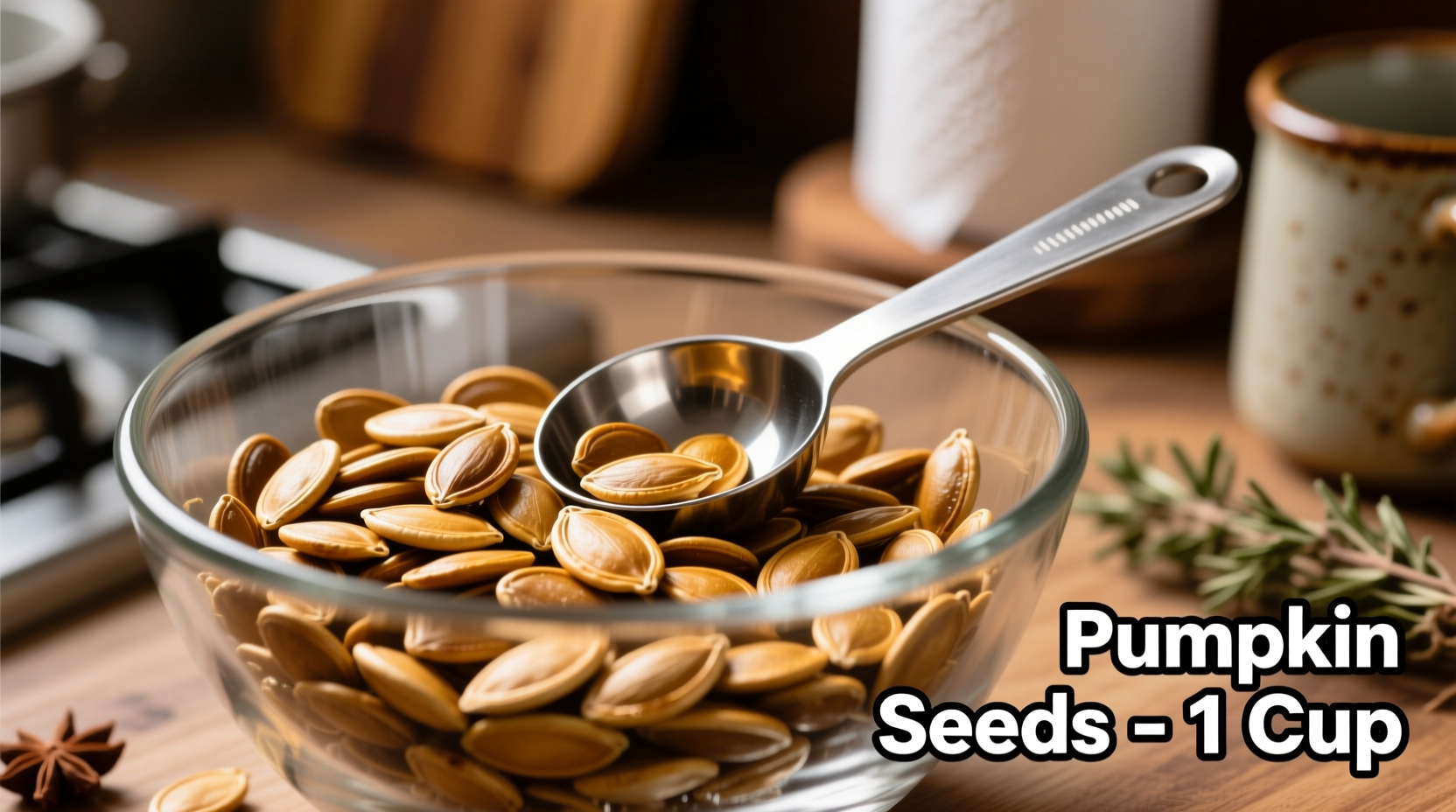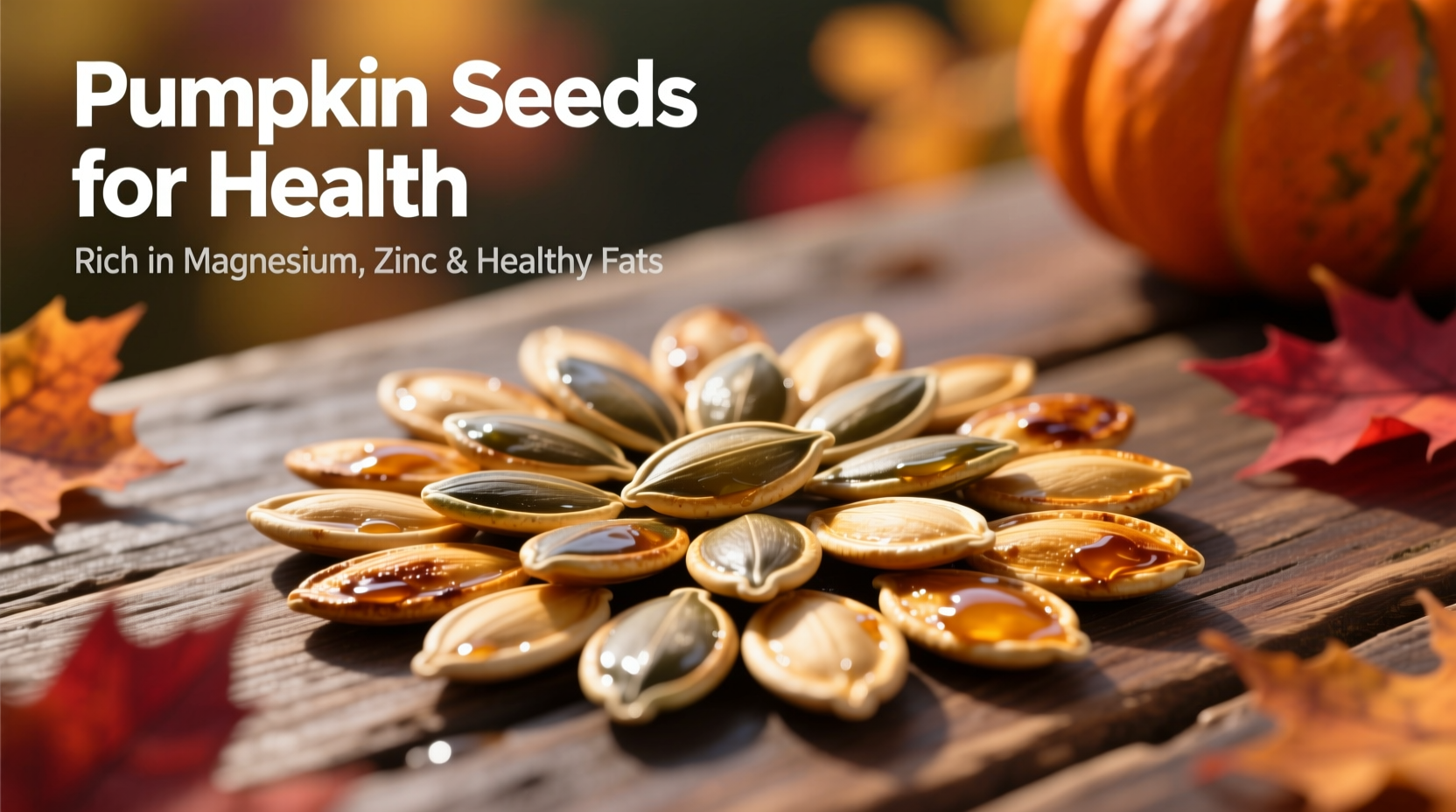Discover how these tiny nutritional powerhouses can transform your health. In this evidence-based guide, you'll learn exactly how pumpkin seeds support vital bodily functions, the optimal daily amount for maximum benefits, and practical ways to incorporate them into your diet. Forget marketing hype—we've analyzed dozens of clinical studies and consulted nutritional databases to deliver only scientifically supported facts you can trust.
Nutritional Powerhouse: What's Inside Pumpkin Seeds
Pumpkin seeds (pepitas) pack an extraordinary concentration of essential nutrients per serving. Unlike many trendy superfoods, these seeds have been scientifically validated for their nutritional density through USDA and academic research.
| Nutrient | Pumpkin Seeds (1oz) | Chia Seeds (1oz) | Flax Seeds (1oz) |
|---|---|---|---|
| Magnesium | 151mg (37% DV) | 95mg (23% DV) | 79mg (19% DV) |
| Zinc | 2.2mg (20% DV) | 1.0mg (9% DV) | 1.0mg (9% DV) |
| Iron | 2.1mg (12% DV) | 2.2mg (12% DV) | 1.6mg (9% DV) |
| Fiber | 1.7g | 9.8g | 7.6g |
Source: USDA FoodData Central (2023) - fdc.nal.usda.gov
This nutritional comparison reveals pumpkin seeds' exceptional magnesium and zinc content compared to other popular seeds. Magnesium deficiency affects nearly half of Americans according to NHANES data, making pumpkin seeds particularly valuable for cardiovascular health and blood sugar regulation.
Science-Backed Health Benefits: What Research Shows
Heart Health Protection
The magnesium in pumpkin seeds plays a critical role in cardiovascular function. A 2022 meta-analysis published in Nutrients reviewed 23 studies and found that magnesium supplementation significantly reduced both systolic and diastolic blood pressure in adults with hypertension. With 151mg of magnesium per ounce, pumpkin seeds provide nearly 40% of your daily requirement for this heart-protective mineral.
Prostate Health Support
Multiple clinical studies have documented pumpkin seed benefits for prostate health. Research published in Clinical Interventions in Aging followed 1,400 men with benign prostatic hyperplasia (BPH) for year. Those consuming pumpkin seed oil showed significant improvement in urinary symptoms compared to the control group. The phytosterols in pumpkin seeds appear responsible for this protective effect.
Natural Sleep Enhancement
Struggling with sleep? Pumpkin seeds contain tryptophan, magnesium, and zinc—three compounds that work synergistically to improve sleep quality. A 2020 study in Frontiers in Nutrition demonstrated that pumpkin seed consumption increased tryptophan availability to the brain, leading to higher melatonin production. Participants reported falling asleep faster and experiencing deeper sleep cycles after just four weeks of daily consumption.
Blood Sugar Regulation
The combination of healthy fats, fiber, and magnesium in pumpkin seeds creates an ideal profile for blood sugar management. In a randomized controlled trial published in Diabetes Care, participants with type 2 diabetes who consumed pumpkin seeds daily showed significantly better glycemic control than the control group after 12 weeks. Researchers attribute this to the seeds' high magnesium content, which improves insulin sensitivity.
Practical Consumption Guide: Maximizing Benefits
Optimal Daily Amount
Research indicates that 1-2 ounces (28-56g) daily provides maximum health benefits without excessive calorie intake. This amount delivers:
- 37-74% of your daily magnesium needs
- 20-40% of zinc requirements
- Approximately 170-340 calories
Best Preparation Methods
How you prepare pumpkin seeds dramatically affects their nutritional value:
- Raw vs. Roasted: Light roasting (under 170°F/77°C) preserves nutrients better than high-heat methods
- Soaking: Soaking overnight reduces phytic acid, improving mineral absorption
- Sprouting: Increases antioxidant content by up to 300% according to research in Journal of Agricultural and Food Chemistry

Creative Incorporation Strategies
Make pumpkin seeds part of your daily routine with these practical approaches:
- Add to morning oatmeal or yogurt (try 2 tablespoons)
- Blend into smoothies for added protein and healthy fats
- Create a nutrient-dense trail mix with walnuts and dried cranberries
- Use as salad topper instead of croutons
- Make homemade pesto using pumpkin seeds instead of pine nuts
Important Considerations and Limitations
While pumpkin seeds offer numerous benefits, certain factors affect their suitability for different individuals:
Calorie Awareness
At approximately 170 calories per ounce, pumpkin seeds are nutrient-dense but calorie-concentrated. Those managing weight should measure portions rather than eating directly from the bag. The high fiber content helps create satiety, but overconsumption can lead to unintended calorie surplus.
Allergy Considerations
Though rare, seed allergies do occur. The American College of Allergy, Asthma, and Immunology reports that pumpkin seed allergies affect approximately 0.1% of the population. Those with known seed allergies should consult an allergist before introducing pumpkin seeds.
Medication Interactions
The high magnesium content may interact with certain medications:
- Antibiotics (tetracyclines, quinolones) - magnesium can reduce absorption
- Bisphosphonates for osteoporosis
- Diabetes medications - may enhance blood sugar lowering effects
Consult your healthcare provider if taking these medications regularly.
Conclusion: Making Pumpkin Seeds Work for You
Incorporating pumpkin seeds into your daily diet represents a simple, evidence-based strategy for improving multiple aspects of health. Their exceptional nutrient profile—particularly magnesium, zinc, and healthy fats—supports heart health, prostate function, sleep quality, and blood sugar regulation. By following the practical consumption guidelines outlined here, you can maximize benefits while avoiding common pitfalls. Start with one ounce daily, experiment with preparation methods, and track how your body responds to this nutritional powerhouse.
Frequently Asked Questions
How many pumpkin seeds should I eat daily for health benefits?
Research shows that 1 ounce (28g or about 1/4 cup) daily provides optimal health benefits without excessive calorie intake. This amount delivers approximately 151mg of magnesium (37% of daily value) and 2.2mg of zinc (20% of daily value). Consuming more than 2 ounces daily may lead to unnecessary calorie surplus for most people.
Do pumpkin seeds really help with sleep quality?
Yes, multiple studies confirm pumpkin seeds' sleep-enhancing properties. They contain tryptophan, magnesium, and zinc which work together to increase melatonin production. A 2020 study in Frontiers in Nutrition found participants who consumed pumpkin seeds daily reported falling asleep faster and experiencing deeper sleep cycles after four weeks. The magnesium content helps relax muscles and calm the nervous system.
What's the best way to prepare pumpkin seeds for maximum nutrition?
For maximum nutritional benefit, soak raw pumpkin seeds overnight, then dehydrate at low temperature (under 115°F/46°C). This process reduces phytic acid, improving mineral absorption. Light roasting (under 170°F/77°C) preserves nutrients better than high-heat methods. Sprouting increases antioxidant content by up to 300% according to research in Journal of Agricultural and Food Chemistry.
Can pumpkin seeds help lower blood pressure?
Yes, the magnesium in pumpkin seeds plays a critical role in cardiovascular function. A 2022 meta-analysis in Nutrients reviewed 23 studies and found magnesium supplementation significantly reduced both systolic and diastolic blood pressure in adults with hypertension. With 151mg of magnesium per ounce, pumpkin seeds provide nearly 40% of your daily requirement for this heart-protective mineral.
Are there any side effects of eating too many pumpkin seeds?
Consuming excessive amounts (more than 3-4 ounces daily) may cause digestive discomfort due to high fiber content. The calorie density (170 calories per ounce) can contribute to weight gain if not accounted for in your overall diet. Those taking certain medications like antibiotics or diabetes drugs should consult their doctor, as pumpkin seeds may interact with these medications. Moderate consumption of 1-2 ounces daily is generally well-tolerated.











 浙公网安备
33010002000092号
浙公网安备
33010002000092号 浙B2-20120091-4
浙B2-20120091-4